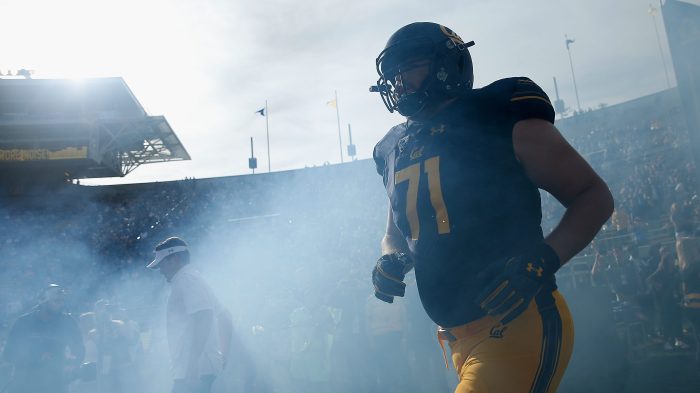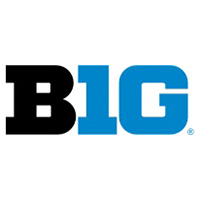"Players of the Pac-12 say they will opt out of season over concerns of COVID-19" https://twitter.com/i/events/1289952183413137410?s=09
Last edited:

This is so dumb.
Why you say that?
Tired of these guys acting like college is free for everybody.
Tired of these guys acting like college is free for everybody.

 bigten.org
bigten.org
I fdont get this
The way i see it is that while the big school/big name athletes do bring in alot of money, they always talk as though they get nothing in return and they doing all this for free.
The truth is they have better accommodations/perks then everybody else in school, on top of getting their education paid for.
Theres alot of rules in the NCAA that are completely ridiculous. The power they have over these kids really is wayyyy out of line. That side is true.
The side that is not true is that these kids get taken advantage of. Think about ALL the kids playing college football. How many make it to the NFL? So all these other kids got to go to college for free, get a degree, play the sport they love at a high level, and after 5 years they join the real world with ZERO DEBT. Lets be honest, you know pretty early if you have a shot at the NFL, for all those who dont they can take the time to maximize their educational goals.
The rest of us leave college with an enormous debt, we had to play our sports at the park/Y, had to work part or full time throughout, and got NONE of the perks. For example, if i wanted healthcare that was extra on my bill. If i wanted access to the gym that was extra on my bill...
All im saying is lets not pretend that these kids get nothing.
The way i see it is that while the big school/big name athletes do bring in alot of money, they always talk as though they get nothing in return and they doing all this for free.
The truth is they have better accommodations/perks then everybody else in school, on top of getting their education paid for.
Theres alot of rules in the NCAA that are completely ridiculous. The power they have over these kids really is wayyyy out of line. That side is true.
The side that is not true is that these kids get taken advantage of. Think about ALL the kids playing college football. How many make it to the NFL? So all these other kids got to go to college for free, get a degree, play the sport they love at a high level, and after 5 years they join the real world with ZERO DEBT. Lets be honest, you know pretty early if you have a shot at the NFL, for all those who dont they can take the time to maximize their educational goals.
The rest of us leave college with an enormous debt, we had to play our sports at the park/Y, had to work part or full time throughout, and got NONE of the perks. For example, if i wanted healthcare that was extra on my bill. If i wanted access to the gym that was extra on my bill...
All im saying is lets not pretend that these kids get nothing.
So would you rather have a 20,000 scholarship or make 200k off your name and likeness.
What about the rest of the kids that get a full ride without risking their health not to mention their study time. These kids bring it millions and most will never earn a dime from their labor.
These kids are there because they WANT to play football. Health risks and all.
The dime they see for their labor is a 5 year full scholarship.
Again, why are we acting as though that isnt worth anything?
Spend 5 years at UCLA and tell me what kind of bills you leaving with.
Im all for these kids fighting for the best health measures in these COVID times. Thats real. They should get our support in that fight. What I didnt like from the article is that there was no mention of the educational opportunities these kids get.
5 yrs at UCLA is maybe 160,000 with all costs. The coach makes about TEN TIMES that in 1 year. The lowest grad assistant makes that same 40,000 per year. The athlete spends 40 hrs week on football, PLUS they have to go to class, mostly in bullshit majors, that the coaches "pick or recommend" for them.
Time in, does no match the compensation or the actual real value per person. That study from depaul calculated EACH athlete is worth 1 million to the university over a 4 year span.

If it was only that easy. I’ve worked in academic support at a power 5 school. A lot of these dudes wouldn’t be in college without the ability to play sports (I’ve worked with guys who couldn’t type, did know how to research topics for papers, struggled to read) and when they get their the goal is to keep them eligible, so they, and often their parent(s) are just happy they are getting a degree that the long term outlook on employment is an afterthought. Also, remember, they all think they are going to the NFL.According to UCLA, as a non resident I should budget about 67K a year if i wanna go there. Thats 335K over 5 years.

Tuition and Fees
Learn more about the costs associated with attending UCLA, including residency, tuition, fees and more.www.admission.ucla.edu
During the season, the schedual is packed but they get all the extra help they need for class, free of charge of course.
Kids dont HAVE to enroll in bullshit majors. They can put their education first if they want to. UConn and Alabama have the same number of scholarships to give out. Nobody plays football at UConn thinking they gonna make it in the NFL. In fact the overwhelming majority of the kids playing college football today dont have a shot at the NFL. Those who make it are the exception.
So all these other kids get a great shot at an education and are living the sport they love.
It should be free for everybody. Higher learning should not be a privilege.
For those who are talking about the educational benefits these players receive, I assure you that most players receive degrees barely worth the paper it is printed on. In rare instances you get a Myron Rolle. But, keep in mind that the reason he received so much media attention was because he was an anomaly.
Many player do not finish. Many player have lifelong injuries that are not covered by school insurance after they leave the team.
Allowing them to be paid for this sacrifice is the least that the NCAA could do.
Edit: As I have shared before, I am an administrator at a known university who works closely with black students, which includes EVERY black athlete. I get a printed out report every semester of all of these students progress towards their "degrees."
If it was only that easy. I’ve worked in academic support at a power 5 school. A lot of these dudes wouldn’t be in college without the ability to play sports (I’ve worked with guys who couldn’t type, did know how to research topics for papers, struggled to read) and when they get their the goal is to keep them eligible, so they, and often their parent(s) are just happy they are getting a degree that the long term outlook on employment is an afterthought. Also, remember, they all think they are going to the NFL.
As far as scheduling; agreed they get a fair amount of support but their lives are brutal as far as scheduling; the travel, mandatory study halls, training table, having to take all the early classes so they can be at practice by 2:30; having to make alternate arrangements for classes that have labs; shit is brutal and is a 16-18 grind each day. Now one thing that has helped the team (not the athlete imo because it keeps them isolated from the rest of the student body) is online classes. Some athletes are now hardly leaving the athletic facilities because they can do a lot of the classes online. Not the STEM majors obviously but the ones in humanities or sports management or administration (common athletic major at my power 5 school) can be at the football complex all day up until practice, and in between classes they are being studying the sport.
For the kids whose parents know what they need to get out of college, they have a better shot of getting a decent degree and have all the post college connections to get them into the workforce making real money. Unfortunately a vast majority of those parents at Power 5’s are white. The black first generation athletes are lambs to the slaughter unless they have an advocate looking past their NFL potential and guiding them towards life after sports.
Y’all better read this.If it was only that easy. I’ve worked in academic support at a power 5 school. A lot of these dudes wouldn’t be in college without the ability to play sports (I’ve worked with guys who couldn’t type, did know how to research topics for papers, struggled to read) and when they get their the goal is to keep them eligible, so they, and often their parent(s) are just happy they are getting a degree that the long term outlook on employment is an afterthought. Also, remember, they all think they are going to the NFL.
As far as scheduling; agreed they get a fair amount of support but their lives are brutal as far as scheduling; the travel, mandatory study halls, training table, having to take all the early classes so they can be at practice by 2:30; having to make alternate arrangements for classes that have labs; shit is brutal and is a 16-18 grind each day. Now one thing that has helped the team (not the athlete imo because it keeps them isolated from the rest of the student body) is online classes. Some athletes are now hardly leaving the athletic facilities because they can do a lot of the classes online. Not the STEM majors obviously but the ones in humanities or sports management or administration (common athletic major at my power 5 school) can be at the football complex all day up until practice, and in between classes they are being studying the sport.
For the kids whose parents know what they need to get out of college, they have a better shot of getting a decent degree and have all the post college connections to get them into the workforce making real money. Unfortunately a vast majority of those parents at Power 5’s are white. The black first generation athletes are lambs to the slaughter unless they have an advocate looking past their NFL potential and guiding them towards life after sports.

